The Rape of Hangzhou
Sunday 2 October 2005
Woke up at an ungodly hour to take the train to Hangzhou (杭州), home of West Lake (西湖), one of the most beautiful lakes in China. While the station was crowded, it wasn't as insane as we thought it'd be. It took about three hours, and I managed to almost-finish a nice murder mystery/satire-on-the-reality-TV book along the way (Ben Elton's Dead Famous) - I'd end up finishing it on the return journey. I do realize I'm probably not the best person to go for a long journey with; I can't possibly hold a conversation that long. That's why you should always bring a book. I do.
According to the tourist brochure we picked up at the train station (the lady at the counter warned us repeatedly, "It's in English!"), Hangzhou, located in Zhejiang Province (浙江省), is the "Oriental Capital of Leisure", and one of China's seven ancient capitals. To be exact, it was China's capital during the Song Dynasty, from 1138 to 1290.
We put up in the Hangzhou International Youth Hostel, sharing a room with two Chinese men. Rooms were OK, and the bathrooms were perpetually flooded, but it was nothing worse than what an SAF camp would have. Best thing about it would be the location, I guess. Right next to West Lake, with a row of clubs and pubs right outside on the main road.
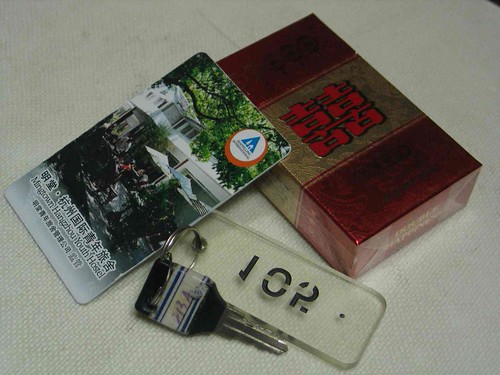
Double Happiness cigarettes blow. I thought they'd be stronger, or taste really nasty, but really they're just kinda blah.
This will only make sense to a select few. Suffice to say that the young lady in question still blanches at the mere mention of the word "Chivas".
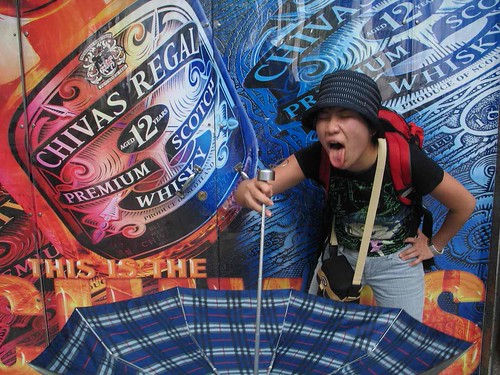
We thought we'd take a little stroll around the lake. Of course, I didn't know it would take three whole hours to do one lap. We didn't do it, of course.
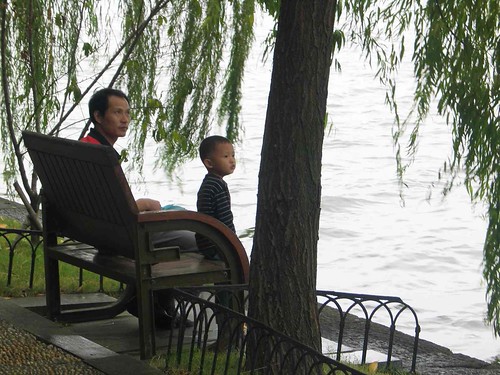
We decided to forget about the lake since it was raining, and everything looked dull and grey and it sucked for photography. Little did I know that it was to rain all day, every day, for the remainder of my trip. Xuanfei had heard good things about this theme park from a colleague, so off to Song City (宋城) we went.
By the time the cab got us there, it was pouring. We paid admission and ducked into a show. It was supposed to be this huge song, dance and acrobatic extravaganza. While the audience around us oohed and aahed at everything, we simply yawned, the sign of the blase cosmopolitan. I mean, come on, lasers? In my opinion, they should only be used in trance concerts and clubs. Not that the acrobats weren't good; I'd just seen better.
The marketplace fared better with us. I bought a whole roasted/fried quail, which looked really sad on its stick. It was dry, skinny and not very tasty at all.
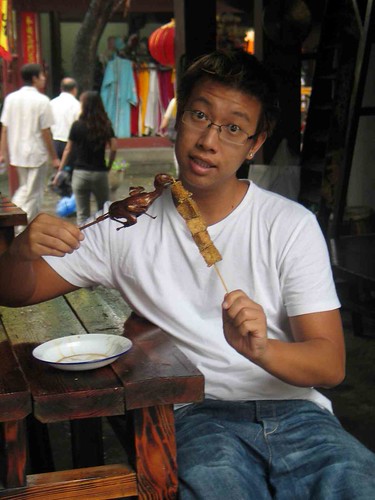
I then tried the rabbit's leg (on the right, below), which was only half-cooked and had a strange musky taste. Wary of strange mutant strains of bacteria hidden in uncooked food in China, I tossed most of it away.
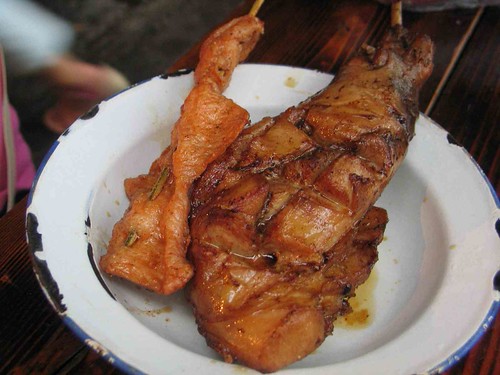
We found a little place that sold Chinese wine in there, and managed to score some free samples from them. I finally had a taste of Gaoliang (高梁), which was supposedly the best kind. It tasted like shit, like if you snuck into a chemistry lab and gulped down some of their spirit straight. OK, I exaggerate; I've probably had worse vodka. At least Gaoliang didn't have any nasty aftertaste. There were some others that were tastier, and we got some of those.
Our first day in Hangzhou was pretty much wasted, but we managed to hop on a little trolley-type vehicle going around the lake and took note of what seemed interesting so we could hit them in what little time we had the next day.
This was a decoration in the male bathroom at the restaurant where we ate dinner. Kinky.
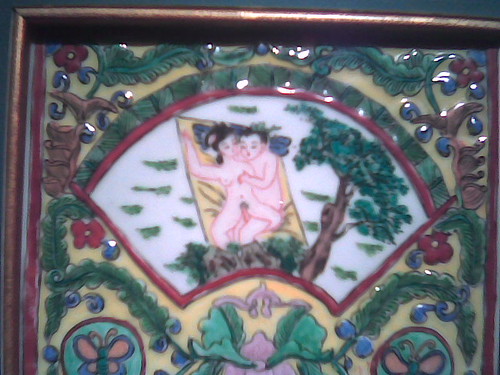
We wanted to check out the nightlife, but it seemed all the clubs were either playing bad ah beng-type techno, bad euro-techno, or had mediocre Chinese pop bands. We finally decided on a "jazz" bar. The 2-person "jazz" band played as much old-school country/pop/rock as they did jazz, but at least their voices were decent. The guy almost sounded like Louis Armstrong, if not for the fact that his pronunciation was decidedly Chinese-atrocious.
Oh well, I suppose the little detail of the bar being named "Friends" and having a decoration scheme consisting of pictures from that American sitcom should have been a warning. You live and learn.
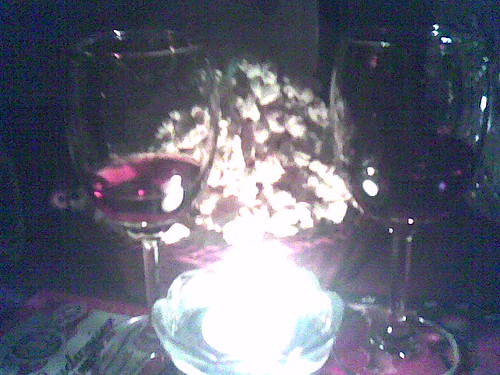
The Chinese seem to love their popcorn. They even serve it with wine (and not very good wine, at that)! How perfectly bizarre.
Monday 3 October 2005
In the morning, while we were having breakfast, the kitties in the hostel said hi to us. Or maybe they just wanted some of our bacon.
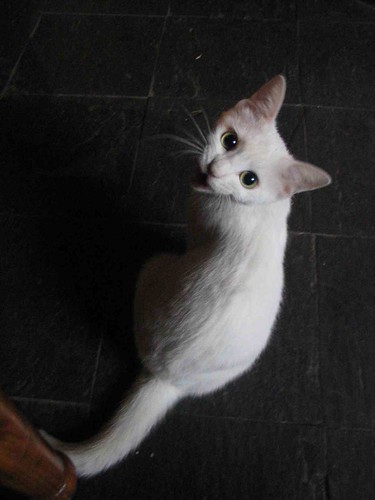
We decided that we had to hit all the spots we wanted to as soon as possible, come rain or shine, since it was our last day here and our train left at 6.30 pm. Traffic being awful because of the crowds, no taxi would go to any tourist attraction, so we had to take the bus everywhere.
First stop: Lingyin Temple (靈隱寺). To get to the temple, we had to pass through a park on the Peak Flying-From-Afar (靈隱飛來峰). On a cliff there were hundreds of Buddhist statues in grottos carved into the hillside. Pretty awesome, but also very dangerous in the wet weather. One slip on the crowded, wet and narrow steps and you could very well go tumbling to the bottom of the slope, taking out a whole battalion of tourists with you. We looked at a couple of them before deciding that we'd rather keep our necks, thank you very much.
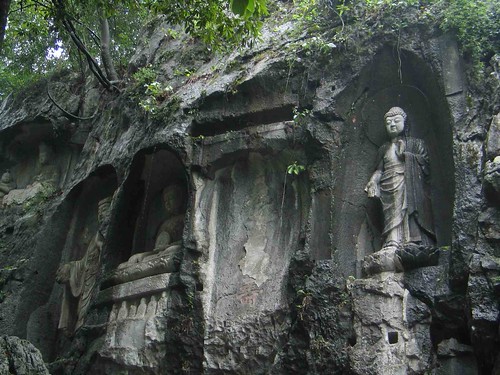
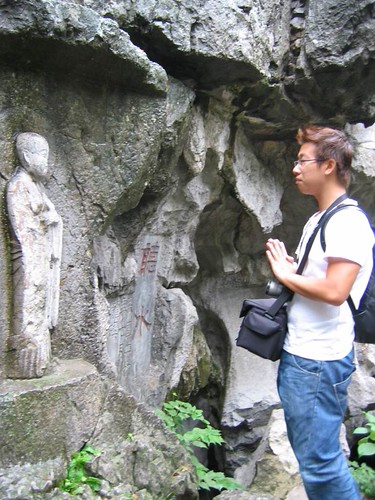
There was also a cave with a Buddha statue in it, roughly translated as "Sliver of Sky Cave of the Goddess of Mercy" (一線天觀音洞). The only light coming into the cave was from the entrances and a little hole in the ceiling.
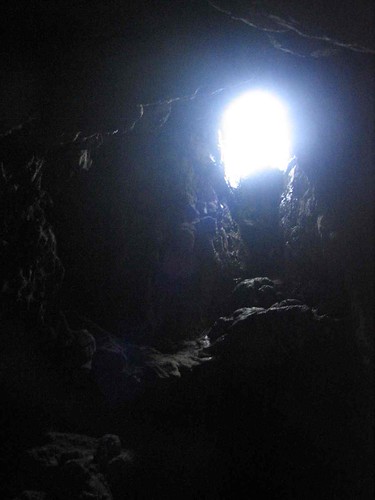
Light can't have been good for the statue, but no one seemed to care and flashes went off all over the place. I'm ashamed to say that I was one of them, but I only flashed once!
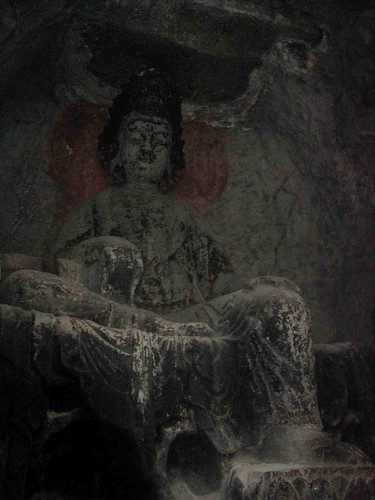
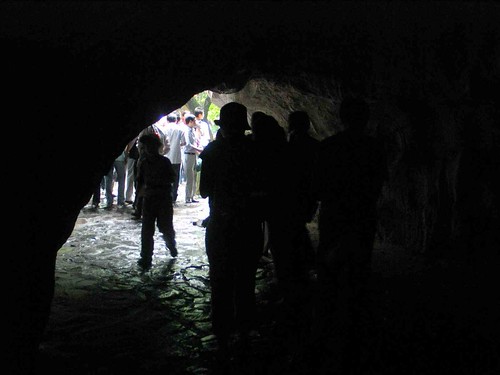
Preferring safety over cool cliff Buddhas, we headed into the temple proper. Lingyin Temple was founded in 326 AD (!) but the oldest structures now date from the 11th century. Still pretty impressive. It's probably the biggest temple I've ever been to, with a whole series of halls that are built progressively higher and higher up the hillside. It's a pretty crazy trek just to get from one end to another. I don't even know what halls we passed through, so these are really just a grab-bag of images.
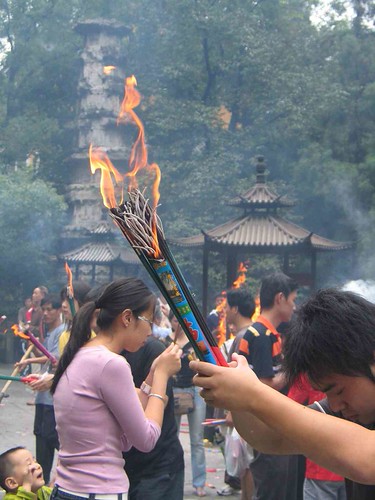
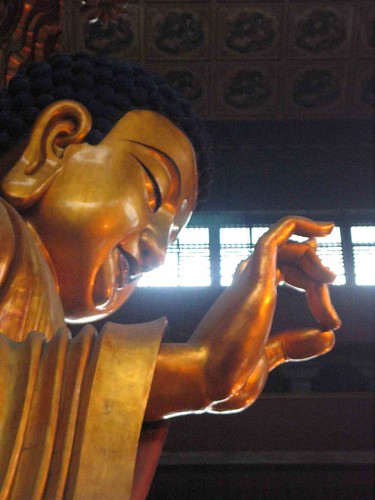
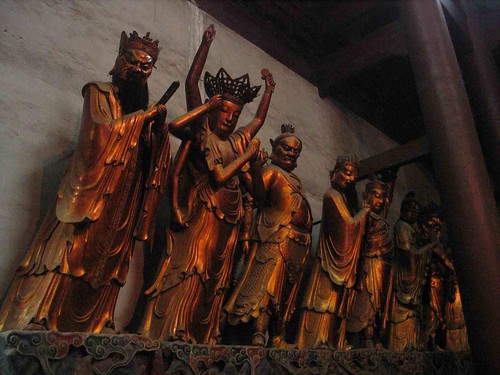
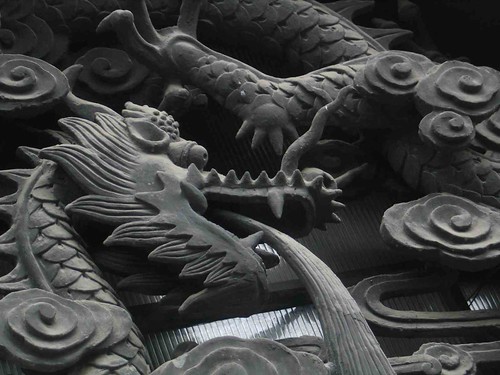
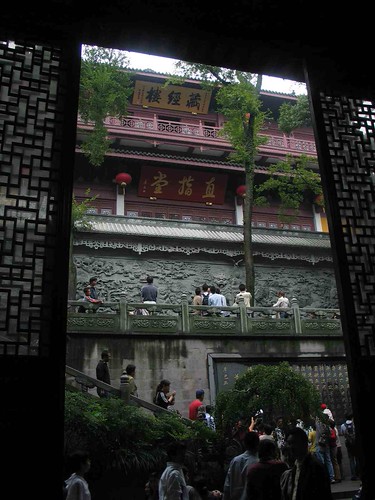
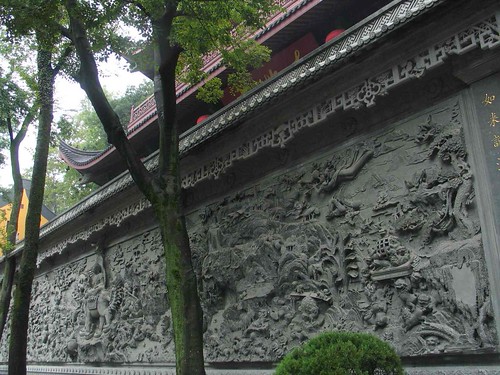
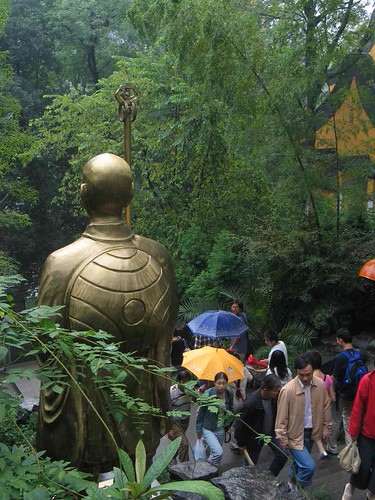
The words below mean "Observe Silently", which none of the hordes of tourists did. They swarmed everywhere, chatting, laughing, crying, yelling, with little or no regard for the sanctity of the ancient religious site they were in. The signs saying "no flash photography" in front of all the halls were completely ignored, and all the monks inside wore a resigned expression - there was really no point in reminding any of the tourists of the rules.
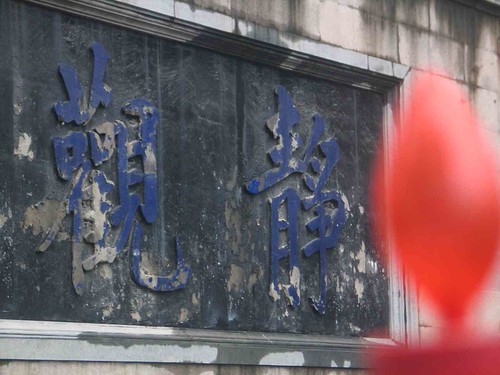
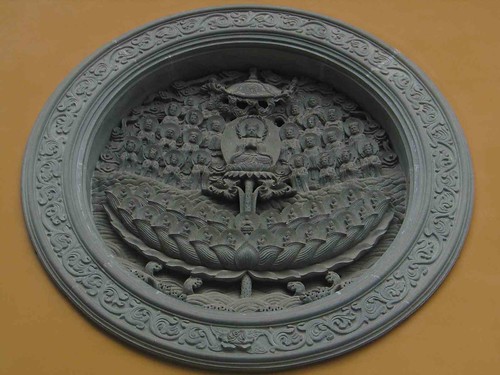
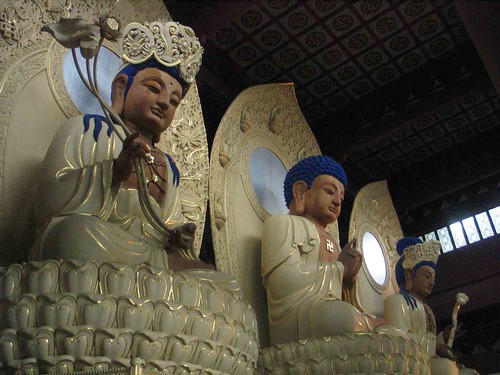
Off to General Yue Fei's Temple and Tomb (岳王廟) we went. Yue Fei (岳飛) was a renowned general in the Southern Song Dynasty, who was framed by the Prime Minister and executed. Now his very name stands for Chinese patriotism, and millions of Chinese schoolchildren across the world learn of his stories, especially that of the phrase his mother tattooed into his back, "Serving the Nation with Wholehearted Loyalty" (盡忠報國) - apologies for the awkward translation.
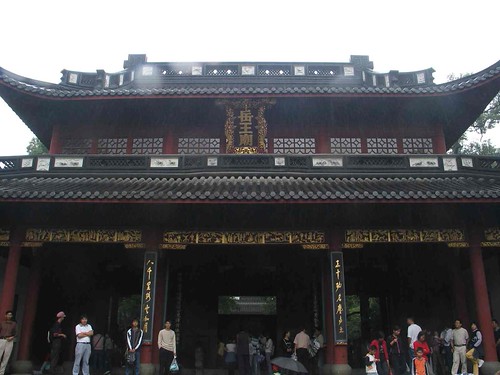
The general himself, with a plaque saying "Return My Rivers and Hills" (還我河山) above him. It's supposed to be in his actual handwriting.
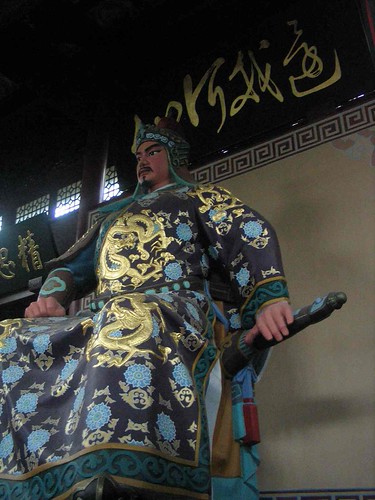
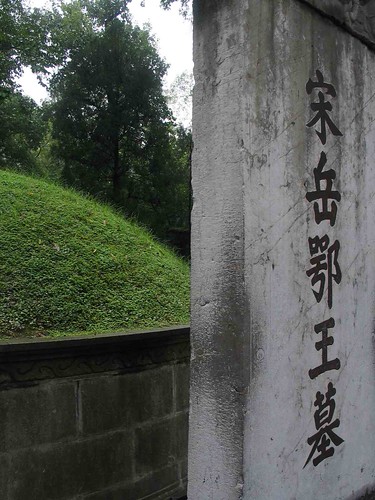
His tomb
Below is the evil Prime Minister, Qin Hui (秦檜) who caused his death. There are statues of him, his wife, and two of his lackeys, all kneeling in chains, surrounded by bars, condemned for all eternity. The authorities have a sign put up above the statues that ask visitors to be civilized and not spit on them. Spitting is really mild compared to what the people were said to have done to actual schemers themselves. Their flesh was supposedly wrapped in bits of dough, deep fried and eaten, giving rise to the popular snack of fried dough fritters, youtiao (油條). Of course, somehow the meat got phased out through the ages, and the fritters you get anywhere are simply dough sticks.
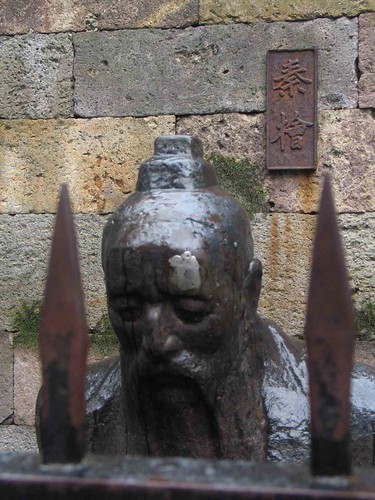
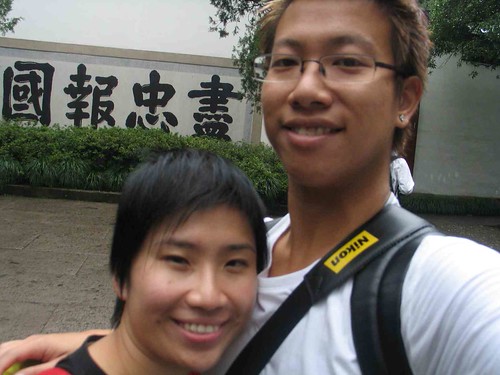
What Yue Fei's mother supposedly tattooed (or carved - ouch!) into his back
Next up was a boat ride across West Lake to our next destination. We figured this would be faster than taking a bus, what with the horrendous traffic around the lake.
Tons of cultural relic areas lie around the lake, like the ones we'd been to above. These include several Causeways built by Famous People, Tombs of Famous Folk, Bridges mentioned in Folk Stories, Bells, Temples, Hills, etc. I'll probably do them all in detail the next time I visit the place... if I ever do.
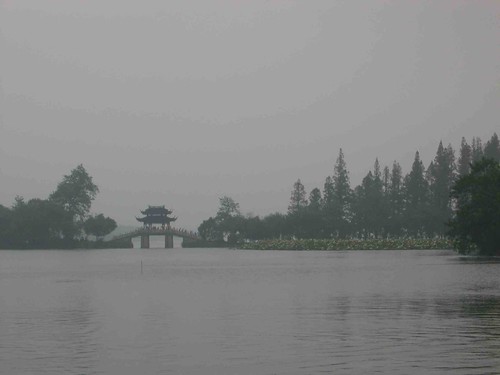
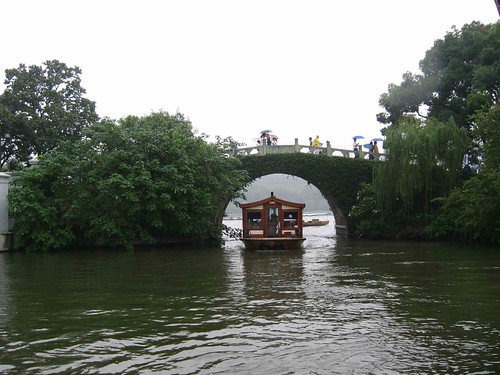
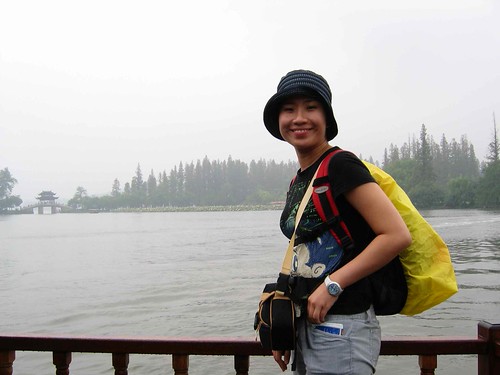
There was no straight ferry to where we wanted to go; in fact we had to stop and transfer at two islets along the way. On one of the islets, Lesser Yingzhou Isle (小瀛洲) was Three Pools Mirroring the Moon (三潭印月) where you can supposedly see three reflections of the moon on the surface of the water if the skies were right.
I'd assumed it was three pools in the middle of the islet, but it was actually three little structures sticking out of the water off the side of the islet. I can't for the life of me imagine how there'd be three moons visible.
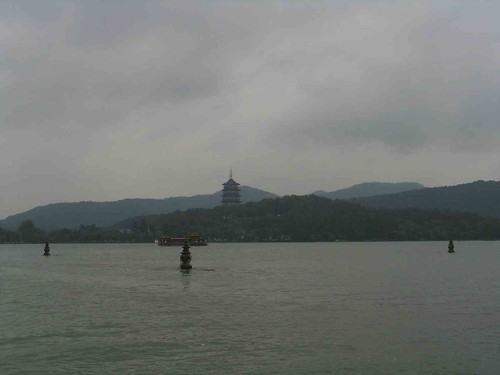
We got off the ferry and headed towards Leifeng Pagoda - one of my must-see's for this trip. Along the way there was a nice statue relating a scene from the legend of Lady White Snake (白蛇傳).
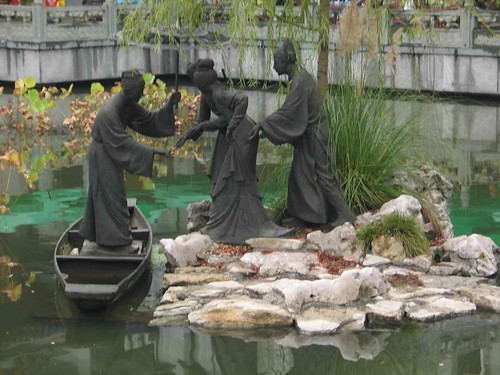
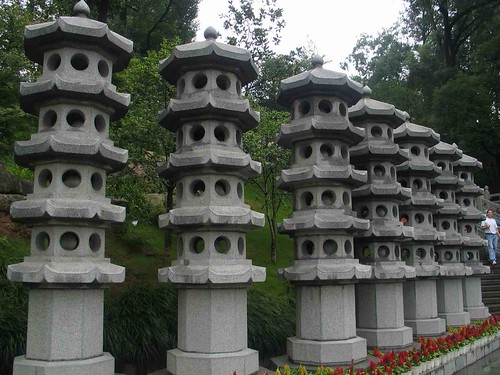
Leifeng Pagoda was where Lady White Snake was imprisoned in the legend. The original tower was very cool-looking, an imposing structure of stone and brick. However, due to its foundation bricks being stolen by superstitious folk over the years (the bricks were said to ward off evil), the tower collapsed in 1924. The ruins still remain in the new rebuilt structure.
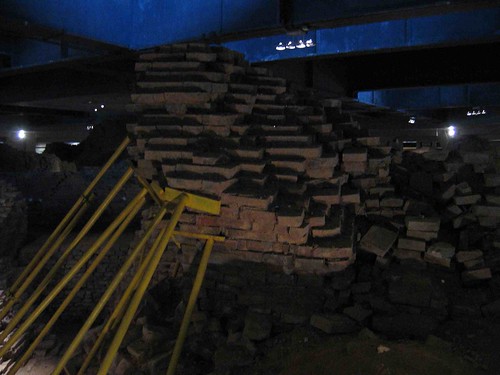
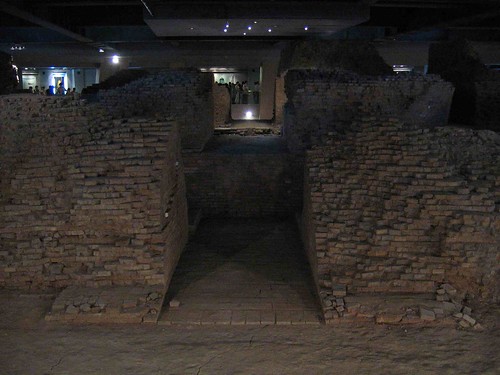
Unfortunately the design they chose for the reconstruction was a very cliched-looking typical Chinese-style pagoda. We were horrified the previous night when we saw the incredibly tacky lighting that adorned the tower as we rode past in the trolley. During the day it didn't look that bad, but there was still the faint hint of tackiness.
At the top of the tower, we got a good view of West Lake. Or we would've if the weather hadn't been so fucking shitty.
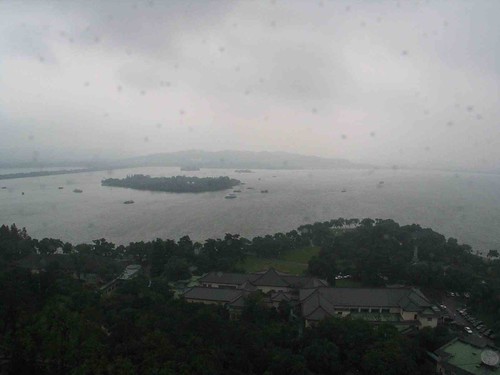
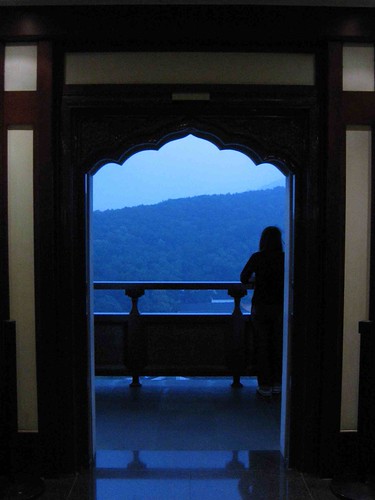
This is actually a not-so-tacky picture of the Pagoda lit up at night. It gets worse, believe you me. From this angle you can't see the silly-looking strings of light along the edges of the roof, which is a blessing.
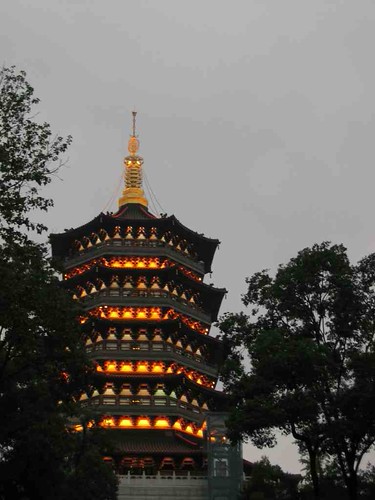
As we waited for the train, I found out a little more about the Golden Week. Apparently the Chinese don't really have the concept of annual leave, or if they do, the number of days they're given is pathetic. Hence the authorities decided that during the week of their National Day, the people would have one week's vacation. However, this is kind of a misnomer, because there are only three official days of holiday. The rest of the seven days is made up either by existing weekends, or by shifting weekends backwards or forwards. Hence most people end up working for almost two weeks in a row after the break.
This is an essentially flawed system, because it means that everyone in China is going to be vacationing during this one week. Airports, trains, buses, everything gets clogged. Essential services run at lower-than-usual efficiency because of both the increased usage and decreased manpower. Tourist attractions run a brisk business, but the damage done to natural and historical relics is unimaginable - basically a state-endorsed, systematic and brutal rape of these locations.
This explains the nightmare that I've found myself in the last couple of days.
This does not, however, explain why it rained all throughout my vacation, except for the first and last day.
After we got back to Shanghai, we found that it was pleasantly cooler (maybe because it was raining - duh!) and managed to find the energy to drag ourselves out for a chili crab supper. Yum. Rather different from Singapore-style chili crab, but still delicious nonetheless.
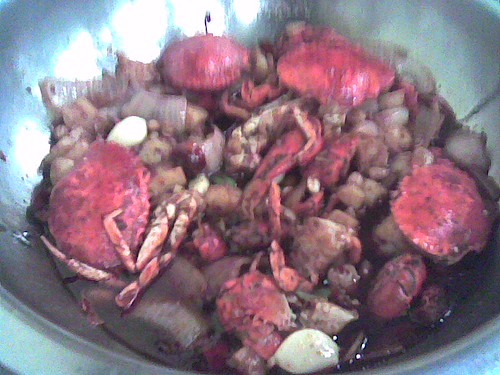
And this post is ridiculously long.
Woke up at an ungodly hour to take the train to Hangzhou (杭州), home of West Lake (西湖), one of the most beautiful lakes in China. While the station was crowded, it wasn't as insane as we thought it'd be. It took about three hours, and I managed to almost-finish a nice murder mystery/satire-on-the-reality-TV book along the way (Ben Elton's Dead Famous) - I'd end up finishing it on the return journey. I do realize I'm probably not the best person to go for a long journey with; I can't possibly hold a conversation that long. That's why you should always bring a book. I do.
According to the tourist brochure we picked up at the train station (the lady at the counter warned us repeatedly, "It's in English!"), Hangzhou, located in Zhejiang Province (浙江省), is the "Oriental Capital of Leisure", and one of China's seven ancient capitals. To be exact, it was China's capital during the Song Dynasty, from 1138 to 1290.
We put up in the Hangzhou International Youth Hostel, sharing a room with two Chinese men. Rooms were OK, and the bathrooms were perpetually flooded, but it was nothing worse than what an SAF camp would have. Best thing about it would be the location, I guess. Right next to West Lake, with a row of clubs and pubs right outside on the main road.

Double Happiness cigarettes blow. I thought they'd be stronger, or taste really nasty, but really they're just kinda blah.
This will only make sense to a select few. Suffice to say that the young lady in question still blanches at the mere mention of the word "Chivas".

We thought we'd take a little stroll around the lake. Of course, I didn't know it would take three whole hours to do one lap. We didn't do it, of course.

We decided to forget about the lake since it was raining, and everything looked dull and grey and it sucked for photography. Little did I know that it was to rain all day, every day, for the remainder of my trip. Xuanfei had heard good things about this theme park from a colleague, so off to Song City (宋城) we went.
By the time the cab got us there, it was pouring. We paid admission and ducked into a show. It was supposed to be this huge song, dance and acrobatic extravaganza. While the audience around us oohed and aahed at everything, we simply yawned, the sign of the blase cosmopolitan. I mean, come on, lasers? In my opinion, they should only be used in trance concerts and clubs. Not that the acrobats weren't good; I'd just seen better.
The marketplace fared better with us. I bought a whole roasted/fried quail, which looked really sad on its stick. It was dry, skinny and not very tasty at all.

I then tried the rabbit's leg (on the right, below), which was only half-cooked and had a strange musky taste. Wary of strange mutant strains of bacteria hidden in uncooked food in China, I tossed most of it away.

We found a little place that sold Chinese wine in there, and managed to score some free samples from them. I finally had a taste of Gaoliang (高梁), which was supposedly the best kind. It tasted like shit, like if you snuck into a chemistry lab and gulped down some of their spirit straight. OK, I exaggerate; I've probably had worse vodka. At least Gaoliang didn't have any nasty aftertaste. There were some others that were tastier, and we got some of those.
Our first day in Hangzhou was pretty much wasted, but we managed to hop on a little trolley-type vehicle going around the lake and took note of what seemed interesting so we could hit them in what little time we had the next day.
This was a decoration in the male bathroom at the restaurant where we ate dinner. Kinky.

We wanted to check out the nightlife, but it seemed all the clubs were either playing bad ah beng-type techno, bad euro-techno, or had mediocre Chinese pop bands. We finally decided on a "jazz" bar. The 2-person "jazz" band played as much old-school country/pop/rock as they did jazz, but at least their voices were decent. The guy almost sounded like Louis Armstrong, if not for the fact that his pronunciation was decidedly Chinese-atrocious.
Oh well, I suppose the little detail of the bar being named "Friends" and having a decoration scheme consisting of pictures from that American sitcom should have been a warning. You live and learn.

The Chinese seem to love their popcorn. They even serve it with wine (and not very good wine, at that)! How perfectly bizarre.
Monday 3 October 2005
In the morning, while we were having breakfast, the kitties in the hostel said hi to us. Or maybe they just wanted some of our bacon.

We decided that we had to hit all the spots we wanted to as soon as possible, come rain or shine, since it was our last day here and our train left at 6.30 pm. Traffic being awful because of the crowds, no taxi would go to any tourist attraction, so we had to take the bus everywhere.
First stop: Lingyin Temple (靈隱寺). To get to the temple, we had to pass through a park on the Peak Flying-From-Afar (靈隱飛來峰). On a cliff there were hundreds of Buddhist statues in grottos carved into the hillside. Pretty awesome, but also very dangerous in the wet weather. One slip on the crowded, wet and narrow steps and you could very well go tumbling to the bottom of the slope, taking out a whole battalion of tourists with you. We looked at a couple of them before deciding that we'd rather keep our necks, thank you very much.


There was also a cave with a Buddha statue in it, roughly translated as "Sliver of Sky Cave of the Goddess of Mercy" (一線天觀音洞). The only light coming into the cave was from the entrances and a little hole in the ceiling.

Light can't have been good for the statue, but no one seemed to care and flashes went off all over the place. I'm ashamed to say that I was one of them, but I only flashed once!


Preferring safety over cool cliff Buddhas, we headed into the temple proper. Lingyin Temple was founded in 326 AD (!) but the oldest structures now date from the 11th century. Still pretty impressive. It's probably the biggest temple I've ever been to, with a whole series of halls that are built progressively higher and higher up the hillside. It's a pretty crazy trek just to get from one end to another. I don't even know what halls we passed through, so these are really just a grab-bag of images.







The words below mean "Observe Silently", which none of the hordes of tourists did. They swarmed everywhere, chatting, laughing, crying, yelling, with little or no regard for the sanctity of the ancient religious site they were in. The signs saying "no flash photography" in front of all the halls were completely ignored, and all the monks inside wore a resigned expression - there was really no point in reminding any of the tourists of the rules.



Off to General Yue Fei's Temple and Tomb (岳王廟) we went. Yue Fei (岳飛) was a renowned general in the Southern Song Dynasty, who was framed by the Prime Minister and executed. Now his very name stands for Chinese patriotism, and millions of Chinese schoolchildren across the world learn of his stories, especially that of the phrase his mother tattooed into his back, "Serving the Nation with Wholehearted Loyalty" (盡忠報國) - apologies for the awkward translation.

The general himself, with a plaque saying "Return My Rivers and Hills" (還我河山) above him. It's supposed to be in his actual handwriting.


His tomb
Below is the evil Prime Minister, Qin Hui (秦檜) who caused his death. There are statues of him, his wife, and two of his lackeys, all kneeling in chains, surrounded by bars, condemned for all eternity. The authorities have a sign put up above the statues that ask visitors to be civilized and not spit on them. Spitting is really mild compared to what the people were said to have done to actual schemers themselves. Their flesh was supposedly wrapped in bits of dough, deep fried and eaten, giving rise to the popular snack of fried dough fritters, youtiao (油條). Of course, somehow the meat got phased out through the ages, and the fritters you get anywhere are simply dough sticks.


What Yue Fei's mother supposedly tattooed (or carved - ouch!) into his back
Next up was a boat ride across West Lake to our next destination. We figured this would be faster than taking a bus, what with the horrendous traffic around the lake.
Tons of cultural relic areas lie around the lake, like the ones we'd been to above. These include several Causeways built by Famous People, Tombs of Famous Folk, Bridges mentioned in Folk Stories, Bells, Temples, Hills, etc. I'll probably do them all in detail the next time I visit the place... if I ever do.



There was no straight ferry to where we wanted to go; in fact we had to stop and transfer at two islets along the way. On one of the islets, Lesser Yingzhou Isle (小瀛洲) was Three Pools Mirroring the Moon (三潭印月) where you can supposedly see three reflections of the moon on the surface of the water if the skies were right.
I'd assumed it was three pools in the middle of the islet, but it was actually three little structures sticking out of the water off the side of the islet. I can't for the life of me imagine how there'd be three moons visible.

We got off the ferry and headed towards Leifeng Pagoda - one of my must-see's for this trip. Along the way there was a nice statue relating a scene from the legend of Lady White Snake (白蛇傳).


Leifeng Pagoda was where Lady White Snake was imprisoned in the legend. The original tower was very cool-looking, an imposing structure of stone and brick. However, due to its foundation bricks being stolen by superstitious folk over the years (the bricks were said to ward off evil), the tower collapsed in 1924. The ruins still remain in the new rebuilt structure.


Unfortunately the design they chose for the reconstruction was a very cliched-looking typical Chinese-style pagoda. We were horrified the previous night when we saw the incredibly tacky lighting that adorned the tower as we rode past in the trolley. During the day it didn't look that bad, but there was still the faint hint of tackiness.
At the top of the tower, we got a good view of West Lake. Or we would've if the weather hadn't been so fucking shitty.


This is actually a not-so-tacky picture of the Pagoda lit up at night. It gets worse, believe you me. From this angle you can't see the silly-looking strings of light along the edges of the roof, which is a blessing.

As we waited for the train, I found out a little more about the Golden Week. Apparently the Chinese don't really have the concept of annual leave, or if they do, the number of days they're given is pathetic. Hence the authorities decided that during the week of their National Day, the people would have one week's vacation. However, this is kind of a misnomer, because there are only three official days of holiday. The rest of the seven days is made up either by existing weekends, or by shifting weekends backwards or forwards. Hence most people end up working for almost two weeks in a row after the break.
This is an essentially flawed system, because it means that everyone in China is going to be vacationing during this one week. Airports, trains, buses, everything gets clogged. Essential services run at lower-than-usual efficiency because of both the increased usage and decreased manpower. Tourist attractions run a brisk business, but the damage done to natural and historical relics is unimaginable - basically a state-endorsed, systematic and brutal rape of these locations.
This explains the nightmare that I've found myself in the last couple of days.
This does not, however, explain why it rained all throughout my vacation, except for the first and last day.
After we got back to Shanghai, we found that it was pleasantly cooler (maybe because it was raining - duh!) and managed to find the energy to drag ourselves out for a chili crab supper. Yum. Rather different from Singapore-style chili crab, but still delicious nonetheless.

And this post is ridiculously long.
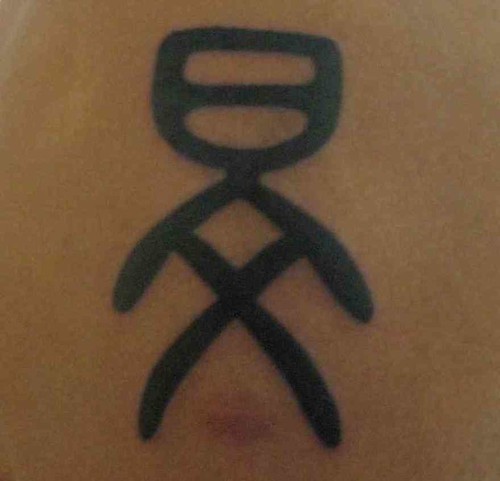


2 Comments:
haha did XF "converse" with that kitty? hehe...
i think ur next stop shld go Beijing... still think that's a must-go place in China...
-ww
Been there, done that. Eleven years ago.
gimme some mindfuckery
<< Home